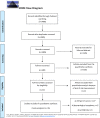Effect of cancer on outcome of COVID-19 patients: a systematic review and meta-analysis of studies of unvaccinated patients
- PMID: 35171096
- PMCID: PMC8956284
- DOI: 10.7554/eLife.74634
Effect of cancer on outcome of COVID-19 patients: a systematic review and meta-analysis of studies of unvaccinated patients
Abstract
Background: Since the beginning of the SARS-CoV-2 pandemic, cancer patients affected by COVID-19 have been reported to experience poor prognosis; however, a detailed quantification of the effect of cancer on outcome of unvaccinated COVID-19 patients has not been performed.
Methods: To carry out a systematic review of the studies comparing the outcome of unvaccinated COVID-19 patients with and without cancer, a search string was devised which was used to identify relevant publications in PubMed up to December 31, 2020. We selected three outcomes: mortality, access to ICU, and COVID-19 severity or hospitalization. We considered results for all cancers combined as well as for specific cancers. We conducted random-effects meta-analyses of the results, overall and after stratification by region. We also performed sensitivity analyses according to quality score and assessed publication bias.
Results: For all cancer combined, the pooled odds ratio (OR) for mortality was 2.32 (95% confidence interval [CI] 1.82-2.94, I2 for heterogeneity 90.1%, 24 studies), that for ICU admission was 2.39 (95% CI 1.90-3.02, I2 0.0%, 5 studies), that for disease severity or hospitalization was 2.08 (95% CI 1.60-2.72, I2 92.1%, 15 studies). The pooled mortality OR for hematologic neoplasms was 2.14 (95% CI 1.87-2.44, I2 20.8%, 8 studies). Data were insufficient to perform a meta-analysis for other cancers. In the mortality meta-analysis for all cancers, the pooled OR was higher for studies conducted in Asia than studies conducted in Europe or North America. There was no evidence of publication bias.
Conclusions: Our meta-analysis indicates a twofold increased risk of adverse outcomes (mortality, ICU admission, and severity of COVID-19) in unvaccinated COVID-19 patients with cancer compared to COVID-19 patients without cancer. These results should be compared with studies conducted in vaccinated patients; nonetheless, they argue for special effort to prevent SARS-CoV-2 infection in patients with cancer.
Funding: No external funding was obtained.
Keywords: COVID-19; SARS-CoV-2; cancer; cancer biology; disease severity; epidemiology; global health; human; meta-analysis; mortality.
© 2022, Di Felice et al.
Conflict of interest statement
GD, GV, FT, MA, PB No competing interests declared
Figures








References
-
- Bauer AZ, Gore R, Sama SR, Rosiello R, Garber L, Sundaresan D, McDonald A, Arruda P, Kriebel D. Hypertension, medications, and risk of severe COVID-19: A Massachusetts community-based observational study. Journal of Clinical Hypertension (Greenwich, Conn.) 2021;23:21–27. doi: 10.1111/jch.14101. - DOI - PMC - PubMed
-
- Brar G, Pinheiro LC, Shusterman M, Swed B, Reshetnyak E, Soroka O, Chen F, Yamshon S, Vaughn J, Martin P, Paul D, Hidalgo M, Shah MA. COVID-19 Severity and Outcomes in Patients With Cancer: A Matched Cohort Study. Journal of Clinical Oncology. 2020;38:3914–3924. doi: 10.1200/JCO.20.01580. - DOI - PMC - PubMed
-
- Cattaneo C, Daffini R, Pagani C, Salvetti M, Mancini V, Borlenghi E, D’Adda M, Oberti M, Paini A, De Ciuceis C, Barbullushi K, Cancelli V, Belotti A, Re A, Motta M, Peli A, Bianchetti N, Anastasia A, Dalceggio D, Roccaro AM, Tucci A, Cairoli R, Muiesan ML, Rossi G. Clinical characteristics and risk factors for mortality in hematologic patients affected by COVID-19. Cancer. 2020;126:5069–5076. doi: 10.1002/cncr.33160. - DOI - PubMed
Publication types
MeSH terms
Associated data
LinkOut - more resources
Full Text Sources
Medical
Miscellaneous

